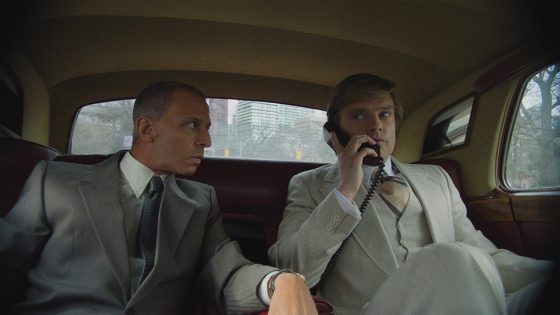“The Apprentice,” a scathing portrait of a young Donald Trump, dominated the Cannes Film Festival, scoring with critics, sparking an eight-minute standing ovation and prompting a fiery response from the 45th president’s legal team.
But nearly two weeks after its “bigly” premiere, the film still doesn’t have a U.S. distributor. Despite strong reviews, feverish media attention, a red-hot director in Ali Abbasi and a starry cast that includes Sebastian Stan and Jeremy Strong, “The Apprentice” remains up for grabs.
Sources close to the dealmaking say there are several potential buyers in the mix representing both theatrical distributors and streamers, and new offers continue to trickle in. But one of those sources revealed that none of the major studios are bidding, including their specialty labels like the Disney-owned Searchlight, Sony Pictures Classics or Focus, which is owned by Universal. Even some of the most daring indie distributors like Neon, which released Abbasi’s “Border,” aren’t offering a deal yet.
Privately, the team behind “The Apprentice” believe that their difficulty securing a distribution deal is analogous to censorship. They argue that these companies are operating out of fear, because releasing the movie could land them on Trump’s bad side, a potentially dangerous place to be given that he is currently leading President Biden in the polls. If he does return to the White House, Trump could exact his revenge, leveraging his position to block or slow deals, while enlisting different regulatory agencies to more closely scrutinize their operations.
And the independent film business, at least its deepest-pocketed distributors, are primarily owned by major studios, which are parts of even larger media conglomerates. That makes them even more hesitant to take on a project that might generate some awards attention and even respectable ticket sales if it means making an enemy of someone who could soon be the most powerful person in the world. The legal headaches and political backlash simply wouldn’t be worth it. That’s left “The Apprentice” struggling to find a courageous distributor that also boasts the kind of financial resources to promote the film and put it in the zeitgeist.
“There are only a few companies who can release that movie,” says one distribution executive who has screened the film. “Any company who has a ‘for sale’ sign or that has the intention of merging [or] buying someone will be hesitant to do it, as there is a chance [Trump’s] regulators will be punitive if he’s elected.”
Studios that are considering merging or selling include Sony, which has joined forces with Apollo to make a $26 billion cash offer for Paramount, a major studio currently for sale. Elsewhere, Warner Bros. Discovery is saddled with debt and seen as a potential acquisition or merger target. One of the companies that could be interested is Comcast, which owns Universal. But any of those deals would need to pass muster with regulators.
And that’s not the only issue. Some companies just don’t want to risk alienating a substantial part of the country. Disney, which emerged battered and bruised from its battle with Florida over the state’s laws affecting the LGBTQ+ community, might be loath to touch a movie like “The Apprentice” and re-enter the culture wars.
Complicating matters is the fact that the film’s investor, billionaire Dan Snyder, must approve any sale. Sources say the former Washington Commanders owner and Trump friend was furious with the portrayal of the former president after screening a cut of the movie in February. While the first half of the film presents a kinder, gentler Trump, depicting him as a social striver with daddy issues, the second half sees the future reality TV star-turned-politician devolve into a narcissist who loses his moral compass and is disloyal to his mentor, Roy Cohn. He’s also depicted raping his first wife, Ivana, and abusing amphetamines.
After Snyder saw the film, his Kinematics’ lawyers sent the filmmakers cease-and-desist letters in a bid to keep the current cut from seeing the light of day, as Variety previously reported. Sources familiar with the back and forth say the filmmakers have not heard from the Kinematics team since the film debuted in Cannes. Still, Kinematics, which was founded by Snyder’s son-in-law Mark Rapaport, likely won’t scuttle a deal because it would damage the fledgling company’s reputation within the creative community and create the impression that it is willing to censor artists. (“The Apprentice” marks Kinematics’ first film.)
Metropolitan FilmExport, which will distribute the film in France, was on the phone dealing with legal issues almost every day during Cannes, according to one insider. Shortly after the film’s festival bow, Trump’s lawyers sent their own cease-and-desist letter to the filmmakers. Those headaches will only intensify when “The Apprentice” prepares to make its public debut. “The movie comes with a ball and chain,” the source adds.
Some U.S. distributors simply didn’t like the film. One company that acquires prestige movies on the festival circuit passed, believing “The Apprentice” looked like a TV movie and lacked originality. Others believed that it humanizes Trump too much. Another buyer stayed on the sidelines for multiple reasons, griping that the movie doesn’t say anything new about Trump’s relationship with Cohn and reasoning that releasing the movie will require inordinate legal resources. But even those who are sitting out believe that Strong has a good shot at finding awards-season traction for his performance.
In the past, larger distributors were more than willing to court controversy. In fact, multiple industry insiders who screened Abbasi’s film in the South of France note that “The Apprentice” would have been tailor-made for Harvey Weinstein, who stormed into the 2004 Cannes edition with Michael Moore’s “Fahrenheit 911,” a withering look at George W. Bush that was released as the president was mounting his reelection bid. Weinstein, of course, is currently in prison and a pariah in the industry after he was accused by dozens of women of sexual harassment, rape and assault.
“Fahrenheit 9/11” aside, political films are a tricky proposition. Another Bush film, Oliver Stone’s “W,” flopped while Adam McKay’s Dick Cheney takedown “Vice” never turned a profit. And even the most successful films don’t usually sway voters, as “The Apprentice” filmmakers hope will be the case. Despite basking in the buzz, winning the Palme d’Or and earning $222 million at the box office worldwide, “Fahrenheit 9/11” didn’t change the course of the election. Bush beat John Kerry five months after the movie was released.
From a commercial perspective, “Fahrenheit 9/11” proved to be lightning in a bottle and that cannot be replicated. In 2017, Weinstein returned to Cannes to sell Moore’s sequel, the Trump doc “Fahrenheit 11/9,” which took aim at the newly elected president. But the package failed to muster much buzz at all, and when the movie finally landed distribution it bombed, earning less than $7 million.
Abbasi himself was warned to avoid Trump as the subject of his next film following his critically acclaimed drama “Holy Spider.”
“Everyone said, ‘If you want to tell something about the world, do it in a nice metaphorical way. How about a World War II movie? How about the First World War? How about an American independence movie? How about the Russian independence movie? What about the Roman Empire?’ And then we ended up in ‘The Planet of the Apes,’” Abbasi said at his Cannes premiere.
But, he concluded, “There is no nice metaphorical way to deal with the rising wave of fascism. Only the messy way.”
“The problem with the world is that the good people have been quiet for too long,” Abbasi said before exiting Cannes’ Grand Théâtre Lumière.
He’s still waiting to see what distributors are willing to make some noise.
Source Agencies



